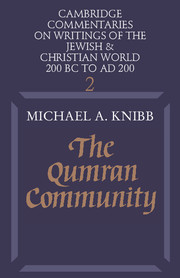Summary
A florilegium is a ‘(collection) of selected passages from the writings of previous authors’, or in other words an anthology, and inasmuch as the work known as 4QFlorilegium provides not only a collection of texts, but also commentary on them, the title is not entirely accurate. In fact the work is best seen as a kind of loosely structured commentary (pēšer) of the kind known from Qumran. Obvious affinities can be seen with the commentaries, such as those on Nahum, Habakkuk and Psalms, but it differs from these in a number of respects: it is not concerned with a single biblical book, or even parts of a single book, but with a selection of texts from different writings; it lacks the consistent use of a series of stereotyped formulas to introduce the commentary; passages from other parts of the Old Testament are frequently used in the course of the commentary sections. This work has also been called ‘A Midrash on the Last Days’. This title is appropriate inasmuch as the work is very much concerned with ‘the end of days’ (see below), and inasmuch as the exegetical methods used within it are comparable to those of the later rabbinic midrashim (for the midrashim, see above, pp. 184–5). The word ‘midrash’ actually occurs in the text (line 14, here translated ‘explanation’), but it would be misleading to think of 4QFlorilegium as if it were a midrash of the type familiar from the later rabbinic literature.
- Type
- Chapter
- Information
- The Qumran Community , pp. 257 - 262Publisher: Cambridge University PressPrint publication year: 1987

